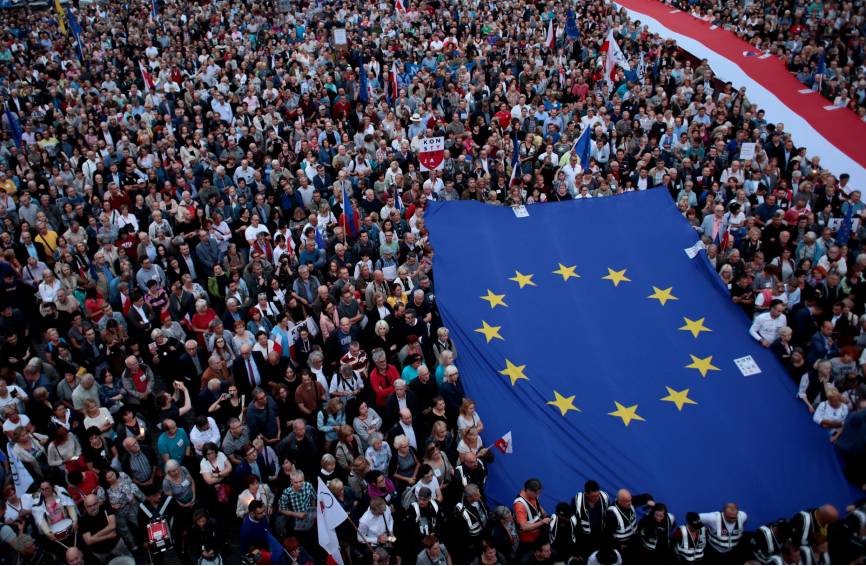As expected, Poland's highest court this week upheld President Andrzej Duda's reelection victory, dismissing charges of voting irregularities brought by the opposition. This follows a decision by EU leaders in the days following last month's election to water down some of the conditionality attached to a new coronavirus recovery fund, denting hopes the fund could be used as leverage to force countries such as Poland and Hungary to respect democratic norms. With no elections until 2023, a strong democratic mandate, and a divided opposition, the conservative Law and Justice (PiS) party will continue to advance its radical agenda.
Duda's victory bolsters hard-liners
Though Duda won the presidential contest by a slim margin, over 10 million Poles supported his vision of a socially conservative, politically authoritarian, and economically autarchic country. His voters were discouraged neither by his homophobic comments, nor his deferential attitude toward party leader Jaroslaw Kaczynski, who is popular among PiS's base. The result might have been influenced by state-run TV stations, which favored the president and denigrated his opponent, but this tactic would not have been effective without broad support for PiS's moral worldview and ideological platform. Both have been legitimized by the election.
The result will affect the balance of power within the PiS-led ruling coalition, strengthening the right-wing Solidarna Polska against the more moderate Agreement. The former is led by Justice Minister Zbigniew Ziobro, who is responsible for a justice reform the EU charges has undermined the independence of the country's courts and is now pushing for Poland's withdrawal from the Istanbul Convention against violence against women. Agreement, led by Jaroslaw Gowin, has been a less reliable coalition partner. Gowin recently quit the government, refusing to support holding an election during the Covid-19 lockdown, though he has continued to back it in parliament.
For now, PiS needs both junior partners to retain its majority in the lower house of parliament, so Kaczynski has been attempting to lure Agreement lawmakers to switch to PiS and has been reluctant to embrace all of Ziobro's ideas. If Agreement were to decide to leave the coalition, PiS could offer its place to the Polish Peasant Party (PSL), now in the opposition. The offer would likely be coupled with the threat to divide the Mazovia province into two regions, which would force a local election and strip the PSL of its only regional government.
Next steps for PiS agenda
Kaczynski has announced a cabinet shuffle to strengthen his party's grip on power. Only Prime Minister Mateusz Morawiecki's position appears to be safe; Foreign Minister Jacek Czaputowicz, Health Minister Lukasz Szumowski, and possibly Finance Minister Tadeusz Koscinski are expected to go. Ziobro and Gowin will each lose control of one ministry: the environment ministry is to be merged with climate and the ministry of higher education might be incorporated into the ministry for schooling, a move that possibly signals a conservative takeover of universities.
A change to the electoral code, previously attempted by Kaczynski, looms as the biggest policy threat. With this, PiS will aim to increase the threshold for parliamentary representations, thereby creating a two-party system. Staunch opposition from the senate will make the change difficult, but Kaczynski will likely continue to push it to help prevent a close race in 2023 parliamentary elections.
The ruling party will also attempt to “re-Polonize” or “de-concentrate” the media sector: code words for squeezing out German companies from the print and online segments, as well as a US firm from the TV market. The issue has become more important for the ruling party following some private media outlets' criticisms of Duda and support offered for his opponent, Rafal Trzaskowski, during the presidential campaign.
Potential obstacles for PiS
The biggest roadblock is posed by the senate, where the opposition holds a two-seat majority. It has been using this majority to delay legislation, undermining PiS's capacity to fast-track controversial measures, and to cut short debates. Since the parliamentary elections in October 2019, Kaczynski has been trying unsuccessfully to change the balance of power in the upper house though efforts to lure opposition representatives in the senate to PiS.
Paradoxically, Duda could present another obstacle. Though his reelection eliminated the risk for PiS of a president from the opposition who would wield veto power, it has also strengthened Duda's position. He is not known for independence, but he has five years to serve with no possibility of a third term and his own legacy to secure. He has fought a deeply divisive campaign that put him at odds with half of the country and is at risk of being charged with violating the constitution for some of his previous decisions. There is a chance Duda will become more moderate and make life difficult for PiS closer to the next round of parliamentary elections in 2023 if the opposition regains momentum. He might also be tempted to burnish his credentials as an independent leader ahead of the succession contest to take over from the 71-year-old Kaczynski. Ziobro, another possible contender for the role, will certainly not moderate his positions, which leaves plenty of space for Duda to differentiate himself by doing so.

 People protest in Warsaw against conservative government's makeover of judiciary. 2018. REUTERS.
People protest in Warsaw against conservative government's makeover of judiciary. 2018. REUTERS.